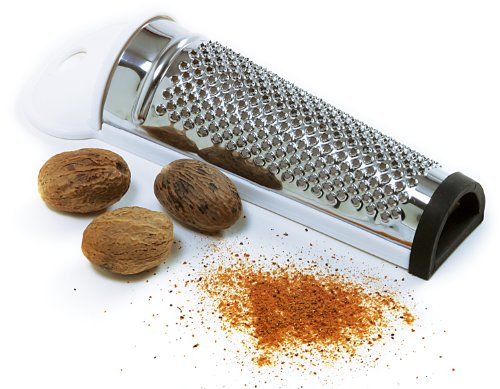We are reader-supported. When you buy through links on our site, we may earn an affiliate commission. Learn more
How To Use Nutmeg Safely! [Read This Before Using It!]
![How To Use Nutmeg Safely! [Read This Before Using It!] - You need only small amounts of nutmeg in your cooking 3 nutmeg in a palm](https://www.careomnia.com/media/how-to-use-nutmeg-safely/care-omnia-how-to-use-nutmeg-safely-in-palm.jpg)
Nutmeg is a commonly used spice that comes from the nutmeg tree.
Nutmeg is filled with nutrients, vitamins, and minerals such as
It's so powerful that using even just a little bit can greatly benefit your health.
Use nutmeg sparingly
Nutmeg is safe in small quantities. But in larger doses, nutmeg is toxic!
In this article, we cover how you can use nutmeg safely to gain only the health benefits of it.
Read below about what happened in Sweden when a magazine decided to publish a recipe for apple pie that had nutmeg in it.
Table of Contents
Be Careful When Using Nutmeg - A Lesson Learned From Sweden
There is an incident with nutmeg that happened in Sweden a few years ago that has stuck with me.
There was a popular food magazine "Matmagasinet" that printed a recipe for "The world's best apple pie".
But the recipe had a serious error, instead of 2 pinches of nutmeg they had written 20(!) nutmegs. Four people went to the hospital.
So even though a cake like that should be too bitter to eat there was actually one family that ate it!
That incident made me think about how many know about the dangers of eating too much nutmeg.
You need to be careful with the amounts written in recipes and you need to measure nutmeg properly when using it.
For more recipes we got an article about how you can use nutmeg that I suggest you go read if you're interested in learning more.
What Type And Where To Buy Nutmeg

Nutmeg can be purchased in two forms, whole or ground.
The pre-ground nutmeg that you find in your grocery store isn't as potent as the fresh nutmeg.
If you want the best flavor of nutmeg, it's recommended to buy the fresh nut, but if you do, remember to be careful when using it. Don't overdo it!
I recommend these Organic Whole Nutmegs #ad on Amazon that is grown on a USDA Certified Organic Farm in Sri Lanka.
You can't get more aromatic fresh nuts than these and they come in a convenient resealable pouch.
Toxic Effect Of Nutmeg
The toxic effects of nutmeg have been purported to be due mainly to myristicin oil.
The effects of nutmeg haven't been extensively studied.
But there are a handful of studies and case reports on the dangerous side-effects of consuming too much myristicin.
What Is Myristicin?
Myristicin is a substance with very unpleasant toxic side-effects if consumed in large quantities.
In the human body, the breakdown of myristicin produces a compound that affects the sympathetic nervous system.
Myristicin can be found in a number of other spices and plants but is present in higher amounts in nutmeg.
Effects Of Using High Amounts of Nutmeg
When large amounts of nutmeg are consumed, several toxic effects have been noted, including
- Tachycardia
- Nausea
- Vomiting
- Agitation
- Anxiety/fear
- Cutaneous flushing
- Decreased salivation
- Hallucinations
Even acute psychosis and anticholinergic-like episodes have been documented as well as fatalities following the ingestion of large doses of nutmeg. Overdoses of nutmeg with fatal outcome is luckily not common (src ◳).
Symptoms arise about 30 minutes to three hours after eating nutmeg. The effects can linger for a day or two.
Why You Should Eat Nutmeg
![How To Use Nutmeg Safely! [Read This Before Using It!] - Nutmeg is a lot more colorful when fresh Care Omnia Undried Nutmeg](https://www.careomnia.com/media/how-to-use-nutmeg-safely/care-omnia-nutmeg-undried.jpg)
Nutmeg contains myristic acid, which can provide numerous health benefits.
That's why you should eat nutmeg. But you should not overuse it.
You can find more several other foods that contain myristic acid in our nutrition tool.
Another benefit is its use as a spice that gives your food or dessert a sweet and warm flavor.
There's nothing like it!
Although it's more commonly used for its flavor than it's health benefits, nutmeg contains an impressive array of powerful compounds that may help prevent disease and promote your overall health.
Among other benefits nutmeg might be able to
- Promote digestion
- Treat insomnia
- Relieve pain
- Promote oral health
- Regulate blood pressure
- Lower cholesterol
How Much Nutmeg Is Enough?
Even though the research is lacking somewhat in the effects of nutmeg, we recommend you stay on the safe side.
Refrain from ingesting more than a typical amount of nutmeg, never exceeding a teaspoon per person. You can start to feel the effects of nutmeg at even ½ teaspoon.
If you're taking any medication you should use even less of it.
It's not advisable to consume nutmeg daily. Do it occasionally.
I recommend using it on special occasions, for example in your eggnog or why not add a new dimension of flavor to your Sunday steak with nutmeg seasoned mashed potatoes.
Most recipes call for 1/4 to 1/2 teaspoon of ground nutmeg or less.
The dish from these recipes is supposed to feed multiple people, making these dishes safe with a low risk of side-effects.
Just don't follow a new recipe blindly as they did in Sweden.
Measure your nutmeg carefully

A whole nutmeg yields 2 to 3 teaspoons of ground nutmeg.
10 grams (approximately 2 teaspoons) of nutmeg is enough to cause symptoms of toxicity.
At doses of 50 grams or more, those symptoms become more severe and can even become lethal (src ◳).
When it comes to the precise measuring of your nutmeg any small and precise enough measuring spoon works.
If you don't have the smaller types I recommend you check out this set of 6 measuring spoons #ad on Amazon.
They go from 1 tbsp to 1/8 tbsp in size.

Using precise measuring is safer and will also help you get that perfect balance of flavors that you aim for in your cooking.
There are special nutmeg graters for those of us who want to enjoy a more hassle-free use of nutmeg.
I recommend this nutmeg grater #ad on Amazon which also has a clever way of acting as a storage container for your nutmeg between uses.
It's quite clever and convenient to use.
Can Children Eat Nutmeg?
The Swedish national food agency advises parents to be careful with giving nutmeg to children.
You should not give nutmeg to children under the age of one. When your child turns one, he or she can normally, eat the same food as the rest of the family.
Between the ages of one to five, you can use nutmeg as a spice but use it sparingly.
The Swedish national food agency is questioning the long-term use of nutmeg in their report called "Advice on food for children 0-5 years".
There is, at the time of writing this article, insufficient evidence of whether nutmeg intake, in the amounts commonly used as a spice in foods, could give rise to long-term adverse health effects.
Especially when giving nutmeg to children at an early age.
We recommend you to not give your young children nutmeg. Just to be on the safe side. At least until the research has concluded it to be safe.
Nut Allergy And Nutmeg
People with a nut allergy should not be at risk of reacting to nutmeg.
Nutmeg is not botanically related to hazelnuts, almonds, or peanuts.
There are also no medical reports on any cross-reaction between these nuts and nutmeg.
But you can find people with a nut allergy that say that they've reacted to nutmeg.
But the connection has not been proven.
Nutmeg Should Not Be Mixed With Medication, Drugs or Alcohol
If you are on medication, you need to be very careful with consuming nutmeg.
Nutmeg can be especially dangerous when mixed with other drugs since it can change how your medication is processed in the liver.
Cases of nutmeg overdose have been linked to serious illnesses and fatalities when used in combination with other medication, drugs, or alcohol.
Can I Use Nutmeg When Pregnant?
No! To stay on the safe side you should skip nutmeg altogether during your pregnancy.
Even though some say that it's generally recognized as safe to consume even as pregnant or breastfeeding when taken in small amounts.
Remember that nutmeg was once considered an abortifacient!
You should avoid consuming nutmeg during pregnancy.
Consuming large quantities can have hallucinogenic effects in fetuses, which may be dangerous.
It also inhibits the production of prostaglandin, which is important in the process of childbirth.
There are reports showing that fetuses get increased heartbeat after the mother has ingested nutmeg.
The increased heartbeat stays for about 12 hours when ingesting 1 tablespoon of nutmeg (src ◳).
Conclusion: Nutmeg, when used carefully, can be very healthy
![How To Use Nutmeg Safely! [Read This Before Using It!] - Packed with nutrients and healthy but use with caution Care Omnia Nutmeg On Tree](https://www.careomnia.com/media/how-to-use-nutmeg-safely/care-omnia-nutmeg-on-tree.jpg)
The Bad
Nutmeg may cause serious side effects, such as hallucinations, rapid heartbeat, nausea, vomiting.
Even death when taken in large doses or combined with other drugs.
The intake of several grams of nutmeg for a short time may cause a high risk of serious poisoning.
However, it appears unlikely that nutmeg, in the amounts commonly used as a seasoning in foods, could cause acute poisoning symptoms.
The Good
The good thing is that nutmeg is a spice you only need a little of to enjoy.
Small amounts give you the taste and its health benefits.
You can easily add it to baked goods, desserts, coffee, hot chocolate, and warm dishes.
Just remember to measure your nutmeg very carefully. Don't overdo it!
And when you must not use nutmeg at all
If you're pregnant, don't eat nutmeg at all. Stay away from nutmeg as it can be dangerous for your fetus.
Frequently asked questions about nutmegs and their safe use
How much nutmeg is safe?
Nutmeg is safe in small quantities. You should never exceed a teaspoon per person. You can start feeling the effects of nutmeg already at half of that. When it comes to children you need be extra careful. Don't give nutmeg at all to children under the age of one. Nutmeg should not be mixed with any medication, drugs or alcohol. Stay away from nutmeg if you’re pregnant.
What are the benefits of eating nutmeg?
Nutmeg is a very flavorful spice that can bring an extra dimension to almost any dish. But that’s not the only reason to eat it. Nutmeg contains powerful compounds that may help prevent disease and promote your overall health. Nutmeg might be able to promote digestion. treat insomnia. relieve pain, regulate blood pressure, lower cholesterol.
How to eat nutmeg?
There are two ways that you can get nutmeg, it’s either whole or grounded. The whole nutmeg is more potent and has usually more flavor when stored for a while than the ground one. If you have a whole nutmeg you need to grade it before using it. You should only use nutmeg as a spice to give your food some extra flavour.
What happens if you eat too much nutmeg?
If you eat too much nutmeg, symptoms will arise from 30 minutes to three hours after consuming it. The effects can linger on up to two days. Symptoms that you might feel are tachycardia, nausea, vomiting, agitation, anxiety, cutaneous flushing, decreased salivation or hallucinations. You can start feeling the effects of nutmeg already at half a teaspoon. At the very extremes the results of consuming too much nutmeg can be fatal.


